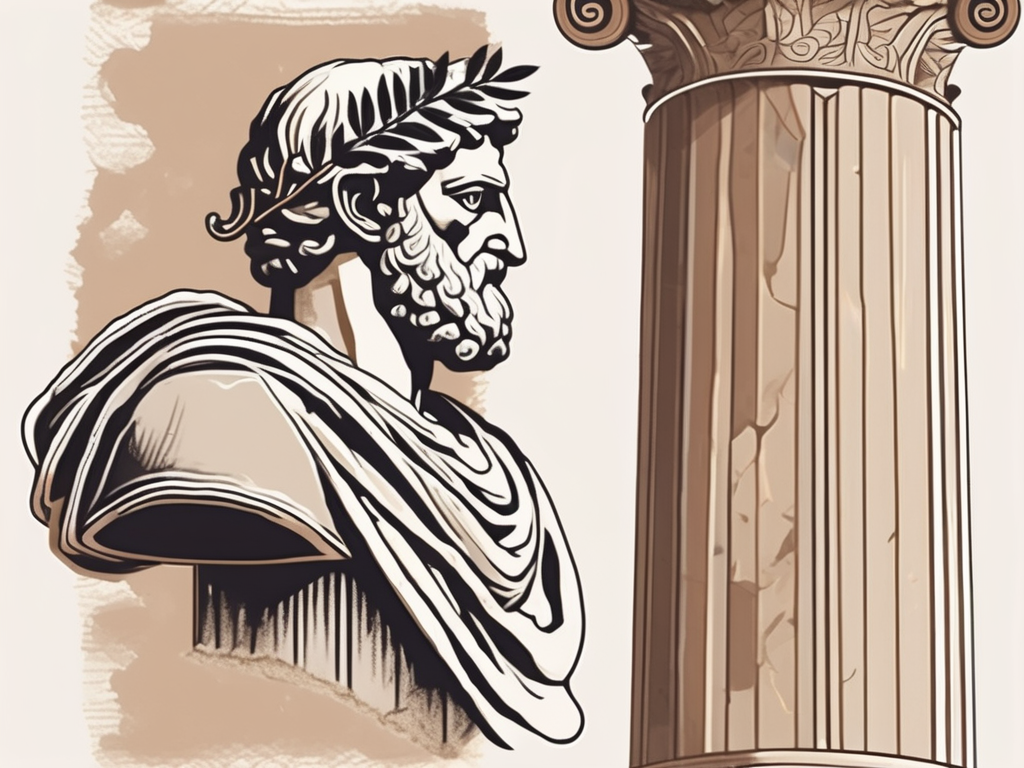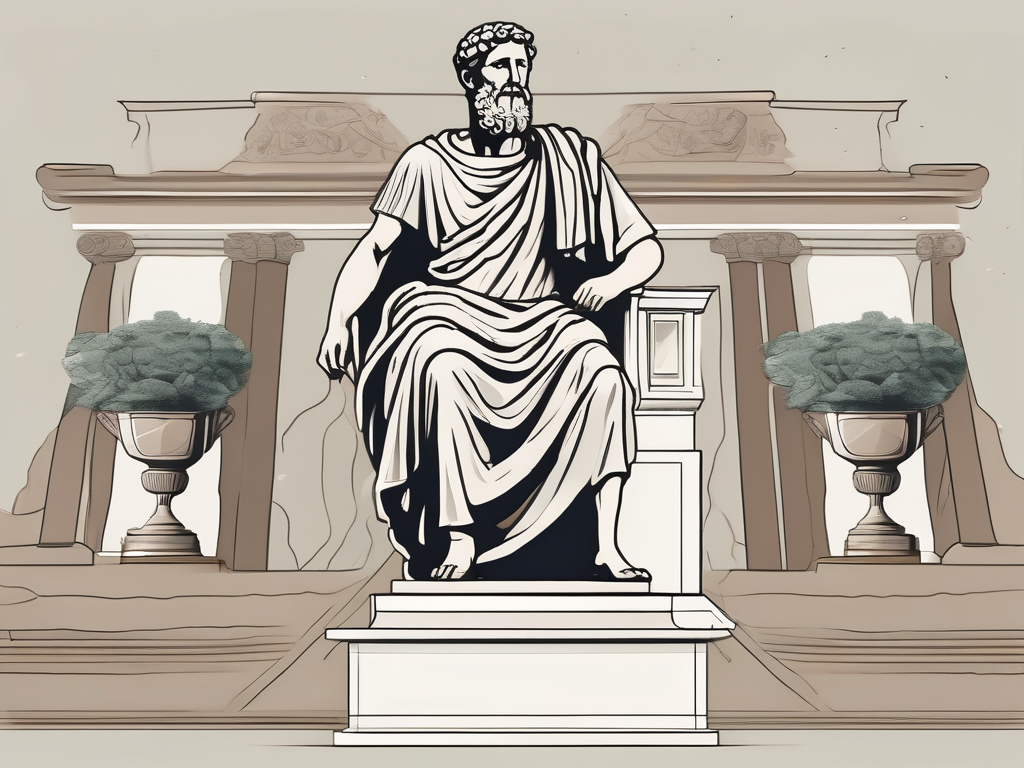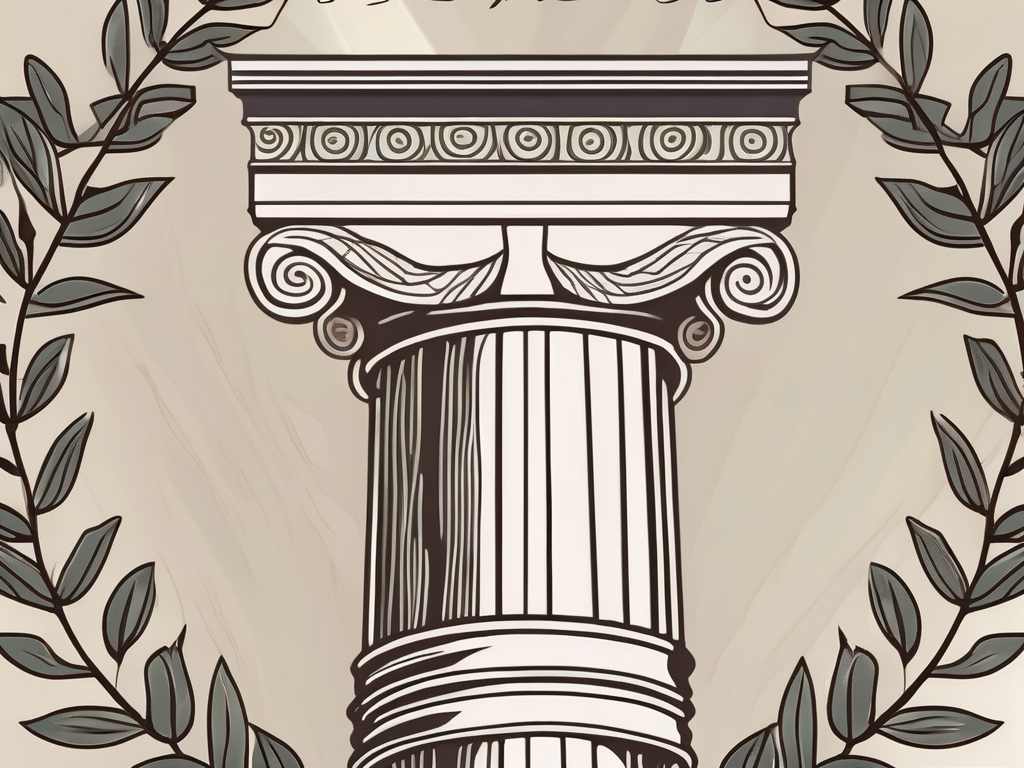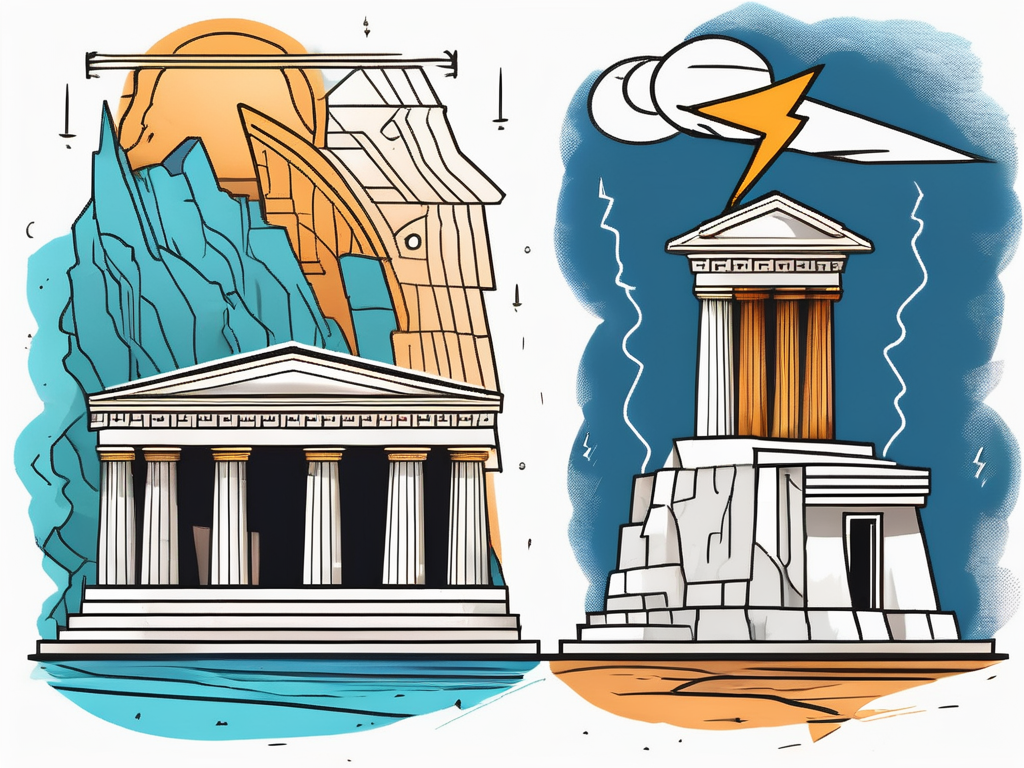Marcus Aurelius, the renowned Roman emperor, was not just a formidable ruler but also a profound philosopher. His ideas and teachings have left an indelible mark on the history of philosophy. In this article, we will explore the life, philosophy, and legacy of Marcus Aurelius, who was not only a significant figure of his time but continues to influence our thinking even today.
Understanding Marcus Aurelius: The Man and The Philosopher
Before delving into his philosophical contributions, it is essential to understand the man behind the philosophy. Marcus Aurelius was born in 121 AD in the city of Rome, into a prominent family. From an early age, he received an education that emphasized intellectual pursuits and the ways of the Stoic philosophy.
But what was life like for Aurelius growing up in ancient Rome? The city was a bustling metropolis, filled with grand architecture, bustling markets, and a diverse population. As a member of a prominent family, Aurelius would have had access to the finest education and cultural experiences that Rome had to offer.
Aurelius’s education was well-rounded and comprehensive. He studied philosophy, literature, and rhetoric under the guidance of renowned scholars. His favorite subject was philosophy, particularly Stoicism, which would profoundly influence his worldview and approach to life.
Imagine Aurelius sitting in a classroom, engrossed in the teachings of his philosophy teacher. The room is filled with the aroma of parchment and ink, as students eagerly debate and discuss the ideas of ancient thinkers. Aurelius, with his keen intellect and thirst for knowledge, would have been an active participant in these intellectual exchanges.
As he grew older, Aurelius’s interest in Stoicism deepened, and he realized that this ancient philosophy had much to offer in terms of personal growth, ethics, and understanding the universe.
But what exactly is Stoicism? It is a philosophy that encourages individuals to cultivate inner strength and resilience in the face of adversity. Stoics believe that true happiness comes from within and can be achieved by living in accordance with nature and reason.
Aurelius embraced these principles wholeheartedly. He saw Stoicism as a way of life, a path to personal fulfillment and moral excellence. It provided him with a framework to navigate the complexities of the world and find meaning in his experiences.
Personal Philosophy and Beliefs
Aurelius was deeply committed to Stoic principles, which emphasized leading a virtuous and purpose-driven life. Stoicism taught him to focus on things he could control, accept the natural order of things, and embrace hardship as an opportunity for growth.
But Aurelius was not just a philosopher; he was also a ruler. As Emperor of Rome, he faced numerous challenges and responsibilities. Stoicism played a crucial role in helping him navigate the complexities of leadership. It taught him to remain calm and composed in the face of adversity, to make decisions based on reason and virtue, and to prioritize the well-being of his subjects.
For Aurelius, philosophy was not merely an intellectual pursuit; it was a practical guide to living a good life. He regularly wrote down his thoughts and reflections, which would later be compiled into his famous work, “Meditations.”
Imagine Aurelius sitting in his study, surrounded by scrolls and books, as he meticulously pens his thoughts on life, virtue, and the nature of the universe. Each word is carefully chosen, each sentence a testament to his deep contemplation and wisdom.
His “Meditations” would go on to become one of the most influential philosophical works in history, providing guidance and inspiration to countless individuals throughout the centuries.
So, when we study Marcus Aurelius, we must not only examine his philosophical contributions but also understand the man behind the philosophy. His upbringing, education, and personal beliefs all shaped his worldview and made him the remarkable philosopher-king that he was.
Marcus Aurelius and Stoicism
Aurelius’s devotion to Stoicism had a profound impact on his rule as a Roman emperor. The stoic principles he embraced shaped his leadership style and policies.
Stoicism, an ancient Greek philosophy, emphasized the importance of virtue, reason, and self-discipline. It taught Aurelius to govern with justice and fairness, to value the common good over personal gains, and to exercise self-control in all aspects of life. These principles guided his decisions as an emperor, ensuring that he ruled with wisdom and integrity.
Moreover, Aurelius believed that a ruler should lead by example and be morally upright. Throughout his reign, he strived to embody these stoic ideals, making him a respected and revered leader.
Influence of Stoicism on Aurelius’s Rule
Stoicism played a pivotal role in shaping Aurelius’s rule as a Roman emperor. It provided him with a moral compass and a framework for making just and fair decisions. By adhering to stoic principles, Aurelius was able to rise above personal biases and act in the best interest of his people.
One of the core tenets of Stoicism is the belief in the inherent worth and dignity of all individuals. Aurelius embraced this principle wholeheartedly, ensuring that his policies promoted equality and justice for all citizens, regardless of their social status or background.
Furthermore, Stoicism taught Aurelius the importance of resilience and perseverance in the face of adversity. As an emperor, he faced numerous challenges, including military campaigns, political intrigues, and natural disasters. However, Aurelius remained steadfast in his commitment to stoic principles, using them as a source of strength and guidance during difficult times.
Stoic Principles in Aurelius’s Meditations
Aurelius’s “Meditations” provides an intimate look into the stoic principles that shaped his thinking. In this collection of writings, he reflects on various topics, such as the transience of life, the power of reason, and the importance of self-discipline.
Through his meditations, Aurelius encourages readers to contemplate their own lives, to seek inner peace, and to live in harmony with nature. He emphasizes the importance of self-awareness and personal growth, urging individuals to constantly strive for moral excellence.
Moreover, Aurelius’s meditations offer practical advice on how to navigate the challenges of life. He provides insights on managing emotions, dealing with setbacks, and finding meaning in difficult circumstances. His stoic philosophy serves as a timeless reminder of the significance of self-reflection and the pursuit of virtue.
In conclusion, Marcus Aurelius’s devotion to Stoicism had a profound impact on his rule as a Roman emperor. The stoic principles he embraced guided his decisions, ensuring that he governed with justice, fairness, and integrity. Aurelius’s “Meditations” further exemplify his commitment to stoic ideals, offering valuable insights on personal growth and moral excellence. His legacy as a stoic leader continues to inspire individuals to this day.
Aurelius’s Reign as Roman Emperor
Aurelius ascended to the throne in 161 AD, facing numerous challenges and major events throughout his reign.
Major Events and Challenges
One of the most significant challenges Aurelius faced was dealing with the invasions of the Germanic tribes. He led his army against the invaders, often sacrificing his own comfort for the well-being of his people.
During his reign, Aurelius also faced economic hardships, political struggles, and the pressures of governing a vast empire. However, he remained steadfast in his commitment to upholding stoic principles and ensuring the welfare of his subjects.
Leadership Style and Policies
Aurelius’s leadership style reflected his stoic beliefs. He believed in a just and benevolent rule, where the needs of the people were prioritized. He implemented various policies to improve the lives of his subjects, including reforms in education, law, and administration.
His dedication to the well-being of his people earned him the admiration and respect of both his contemporaries and future generations.
The Legacy of Marcus Aurelius
Aurelius’s influence extends far beyond his time as emperor. His philosophical ideas have profoundly impacted subsequent philosophers and thinkers.
Influence on Later Philosophers and Thinkers
Philosophers such as Friedrich Nietzsche and Michel Foucault have drawn inspiration from Aurelius’s stoic teachings. Nietzsche, in particular, admired Aurelius’s emphasis on personal responsibility and his rejection of superficial pleasures.
Aurelius’s ideas continue to resonate with individuals seeking guidance on how to navigate life’s challenges and find meaning in the face of adversity.
Aurelius’s Impact on Modern Stoicism
Stoicism has experienced a revival in recent years, partly due to the influence of Aurelius’s teachings. Today, countless individuals turn to stoic philosophy as a practical guide for living a fulfilling life.
Aurelius’s “Meditations” remains a popular read, offering invaluable insights and timeless wisdom for those seeking personal growth and self-improvement.
Debunking Myths about Marcus Aurelius
Over the years, several misconceptions have arisen regarding Aurelius’s life and philosophical contributions.
Misconceptions about Aurelius’s Life
One of the common misconceptions is that Aurelius was a ruthless and power-hungry emperor. On the contrary, he was a compassionate ruler who prioritized the well-being of his people over personal gain.
Another misconception is that he was solely focused on philosophical pursuits and neglected his responsibilities as an emperor. In reality, Aurelius skillfully balanced his philosophical interests with his duties as a statesman.
The Reality of Aurelius’s Philosophical Contributions
Some critics argue that Aurelius did not contribute anything new or original to philosophy. However, his unique perspective on stoicism and his ability to apply philosophical principles to real-world situations set him apart from other philosophers of his time.
Aurelius’s meditations continue to inspire and guide individuals around the world, proving the enduring relevance of his philosophical contributions.
In conclusion, Marcus Aurelius, the Greek philosopher and Roman emperor, left an indelible mark on history. His devotion to Stoicism, reflected in his personal philosophy and reign, continues to influence thinkers and philosophers to this day. From his reflections in “Meditations” to his just and compassionate leadership, Aurelius was a man of great wisdom and integrity. His legacy serves as a powerful reminder of the importance of personal growth, self-awareness, and the pursuit of a virtuous life. Marcus Aurelius truly shaped history through his philosophy and remains a source of inspiration for generations to come.












